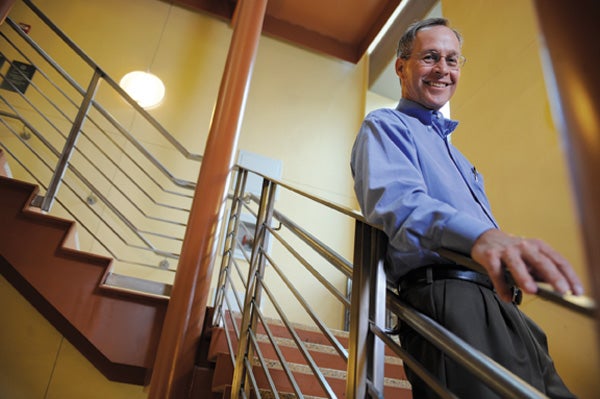
"If you set out with a complete focus on doing everything you can to maximize profits, it leads you to a frame of mind where you might perhaps begin to exploit other stakeholders to achieve that in the short run," says John Elstrott. "That's not a sustainable model."
John Elstrott isn’t just the chairman of Whole Foods Market. He’s also a customer.
“I try to do all my shopping there,” says Elstrott, who in December became chairman of the company when his friend and colleague, Whole Foods founder John Mackey, stepped down. Mackey remains the company’s CEO.
Elstrott, a founding manager of Celestial Seasonings, and Mackey go way back in the natural foods business, but the two share more than just a love of wheat germ and soy milk. They also share a belief in the power of entrepreneurship to transform the world.
Elstrott began teaching entrepreneurship at the Freeman School in 1987, and in 1991 he became founding director of the Levy-Rosenblum Institute, which was established to coordinate the Freeman School’s entrepreneurship initiatives and programs.
At the same time, Elstrott has also remained an active entrepreneur and investor. He is currently chairman of Resource Conservation Fund, a wetland mitigation banking fund that returns alternative-asset yields to its investors through the restoration of wetlands, and he has served on the board of companies including Silk Soy Milk, Laitram Corp., Sambazon, Barriere Construction, PreSonus Audio, Neill Corp. and Source Capital.
“I look at the impact—can it make the world a better place,” Elstrott says of the companies he’s involved with. “I know we’ll make money if we fulfill whatever idealistic mission we have because we’re going to respond to a real need. I want to make a difference.”
Elstrott first got interested in entrepreneurship while working on his master’s thesis at LSU. In studying the philosophy of Adam Smith, Elstrott concluded that the three socio-economic principles necessary for individuals to achieve their full potential are private property, a free-market economy and ethical democratic government.
“Since a free-market economy is part of the package that guarantees the freedom that’s necessary for our evolution, I began to look at what keeps a free-market economy healthy,” Elstrott says. “Well, it’s the entrepreneur. It’s the entrepreneur who’s continually pushing the boundaries, innovating and forcing inefficient companies out of the way.”
Elstrott’s philosophy of entrepreneurship was further influenced by the work of Muhammad Yunus, founder of Grameen Bank and a pioneer in the field of microlending. Yunus’ message—that purpose and profits can go hand in hand—inspired social entrepreneurs around the world, but social entrepreneurship is limited to organizations founded to address social problems. What about organizations with non-social missions?
The answer, Elstrott says, is conscious capitalism.
With roots in the counterculture movement of the 1960s, conscious capitalism rejects Milton Friedman’s argument that a corporation’s primary responsibility is to its shareholders. Instead, it offers a new understanding of capitalism, one that emphasizes the unique, idealistic mission of every business. In 2007, John Mackey founded the Conscious Capitalism Alliance to help promote the movement and its belief that every business should have a purpose beyond profits and that the focus of the business should be on optimizing the alignment of all stakeholders—employees, customers, suppliers, shareholders and community members—in fulfilling that mission.
“It’s saying the best way to serve shareholders is not to focus on maximizing profits,” explains Elstrott, who has lectured extensively on the topic. “If you set about with a complete focus on doing everything you can to maximize profits, it leads you to a frame of mind where you might perhaps begin to exploit other stakeholders to achieve that in the short run. That’s not a sustainable model.”
While social entrepreneurship is limited to organizations established to effect social change, the conscious capitalist philosophy can be applied to all businesses, regardless of their size, focus or industry.
“And the more that we can get entrepreneurs to step up and be conscious capitalists, the less we’re going to need regulations,” Elstrott adds. “To the extent that people are in it just to make as much money as they can, you’re going to need more and more government regulation.”
In 2010, the Tulane Business Plan Competition became the first competition in the country to incorporate principles of conscious capitalism into its requirements. The competition will award a grand prize of $50,000 to the group with the best idea for a business that seeks to positively affect all its stakeholders.
“We’re trying to inspire students and prepare them to be the leaders of tomorrow,” he says. “Hopefully, a lot of them will stay around New Orleans and be conscious capitalists.”

